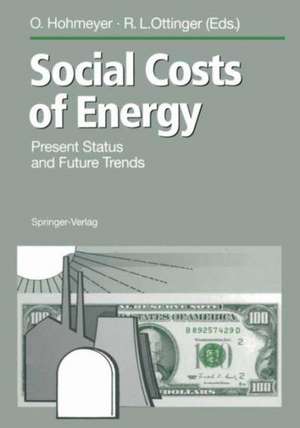Social Costs of Energy: Present Status and Future Trends
Editat de Olav Hohmeyer, Richard L. Ottingeren Limba Engleză Paperback – 22 feb 2012
Preț: 401.61 lei
Nou
Puncte Express: 602
Preț estimativ în valută:
76.88€ • 80.22$ • 64.45£
76.88€ • 80.22$ • 64.45£
Carte tipărită la comandă
Livrare economică 12-26 martie
Preluare comenzi: 021 569.72.76
Specificații
ISBN-13: 9783642851223
ISBN-10: 3642851223
Pagini: 444
Ilustrații: VIII, 430 p.
Dimensiuni: 170 x 242 x 23 mm
Greutate: 0.74 kg
Ediția:Softcover reprint of the original 1st ed. 1994
Editura: Springer Berlin, Heidelberg
Colecția Springer
Locul publicării:Berlin, Heidelberg, Germany
ISBN-10: 3642851223
Pagini: 444
Ilustrații: VIII, 430 p.
Dimensiuni: 170 x 242 x 23 mm
Greutate: 0.74 kg
Ediția:Softcover reprint of the original 1st ed. 1994
Editura: Springer Berlin, Heidelberg
Colecția Springer
Locul publicării:Berlin, Heidelberg, Germany
Public țintă
ResearchDescriere
Although present day politics seems to be preoccupied with questions of economic growth and full employment, the basic environmental problems stemming from the interactions of the economic sphere with global, regional and local environments persist and will have an even greater impact in the future. If economy and ecology are not reconciled in the years to come, mankind will not have a sustainable future on Earth. The typical negation of environmental problems in times of economic crisis is partially due to the fact that environmental and health damages of economic activities are neither priced nor included in our market price system. This allows politicians to focus their attention on insufficient economic indicators which do not reflect the actual development of the welfare of society. If economic lead indicators like GDP or balance of trade figures were better integrated with information on the environmental and health costs caused by the seemingly beneficial economic development, politicians might have better guidance as to what policy choices would benefit society most.
Cuprins
1. Introduction and some Conclusions from the Conference.- 1. Introduction and some Conclusions from the Conference.- Subject Area 1: General Treatment of the Assessment of Social Costs and the Perspective for Their Incorporation.- 2. The Social Costing Debate: Issues and Resolutions.- 3. Perspectives on Incorporation of Environmental Externalities.- 4. The Prospects for the Use of Environmental Benefit Assessment in the EC.- 5. Why Utilities Should Incorporate Externalities.- 6. Internalization of External Costs During the Crisis of Environmental Policy or as a Crisis for Economic Policy.- Subject Area 2: Empirical Estimation of Social Costs of Energy.- 7. Estimating the Impacts, Damages and Benefits of Fuel Cycles: Insights from an Ongoing Study.- 8. Identification and Incorporation of External Costs Associated with Energy Use.- 9. Measuring the External Costs of Fuel Cycles in Developing Countries.- 10. Evaluation of the External Costs of a UK Coal Fired Power Station on Agricultural Crops.- 11. Economics of Nuclear Risks — A German Study.- 12. Environmental Impacts of Photovoltaics/Solar Energy.- 13. External Costs of Rational Use of Energy.- 14. Economic Impacts of Electricity Supply Options.- Subject Area 3: Instruments and Approaches for the Internalisation of Social Costs.- 15. Evaluation of Instruments for the Incorporation of Externalities.- 16. Pollution Taxes — the Preferred Means of Incorporation of Environmental Externalities.- 17. A Prudent CO2 Reduction Policy: Melding Top-Down and Bottom-Up Approaches.- 18. Consideration of Environmental Externality Costs in Utility Buy Back (PURCHASE) Rates.- 19. The Indispensability of Externality Valuation in Least-Cost Planning.- 20. State Externalities Policy and Carbon Dioxide Emissions: Who Bears the Risks of Future Regulation?.- 21. Incorporating Global Warming Externalities through Environmental Least Cost Planning: A Case Study of Western Europe.- 22. Observations on Extending the Set of Externalities to be Quantified.- 23. An Overview of Taxes and Trading as Environmental Control Policies.- 24. Utilitiy Externalities and Emissions Trading: California is Developing a Better Way.- Subject Area 4: Social Costs and Sustainable Development.- 25. From Social Costing to Sustainable Development: Beyond the Economic Paradigm.- 26. Beyond External Costs — a Simple Way to Achieve a Sustainable Energy Future, International and Intergenerational Equity by a Straightforward Reinvestment Surcharge Regime.














